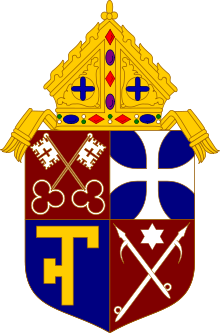Bishop of Berlin
|
Archdiocese of Berlin Archidioecesis Berolinensis Erzbistum Berlin |
|
|---|---|

Coat of Arms of the Archdiocese of Berlin
|
|
| Location | |
| Country | |
| Ecclesiastical province | Berlin |
| Metropolitan | Berlin |
| Statistics | |
| Area | 28,962 km2 (11,182 sq mi) |
| Population - Total - Catholics |
(as of 2015) |
| Parishes | 103 |
| Information | |
| Denomination | Roman Catholic |
| Rite | Roman Rite |
| Established | 13 August 1930 |
| Cathedral | St. Hedwig's Cathedral |
| Patron saint |
St. Hedwig of Andechs St. Otto of Bamberg St. Peter the Apostle |
| Current leadership | |
| Pope | Francis |
| Archbishop | Archbishop Heiner Koch |
| Auxiliary Bishops | Matthias Heinrich |
| Vicar General | Thomas Przytarski |
| Emeritus Bishops | Wolfgang Weider |
| Map | |
 |
|
| Website | |
| erzbistumberlin.de | |
The Archdiocese of Berlin is a Roman Catholic archdiocese, seated in Berlin and covering the northeast of Germany.
As of 2004 the archdiocese has 386,279 Catholics out of the population of Berlin, most of Brandenburg (except of its southeastern corner, historical Lower Lusatia) and Hither Pomerania, i. e. the German part of Pomerania. This means that a little over 6% of the population in this area is Roman Catholic. There are 122 parishes in the archdiocese.
The current Archbishop is Archbishop Heiner Koch, formerly Bishop of Dresden, who was appointed by Pope Francis on Monday, June 8, 2015, to replace the former Archbishop, Cardinal Rainer Maria Woelki, who had earlier been named Archbishop of Cologne (Köln) by Pope Francis.
The affairs of the Roman Catholic Church in the Kingdom of Prussia had been reorganised by the Bull "De salute animarum", issued in 1821. Before the Prussian Provinces of Brandenburg and of Pomerania were part of the Vicariate Apostolic of the Northern Missions after the Reformation in the Duchy of Pomerania in 1534 and in the Electorate of Brandenburg in 1539 and the conversion of the majority of the inhabitants had made the area a Catholic diaspora.
Before the Reformation the westernmost territories of the Berlin diocese were in ecclesiastical respect part of the Diocese of Havelberg, the southwestern and central parts belonged to the Diocese of Brandenburg. The northwestern Rügen island belonged to the Diocese of Roskilde, whereas the northern (Hither Pomerania) and the former northeastern part (Farther Pomerania) on both banks of the Oder formed the exempt Diocese of Cammin, established in 1140 for the territory of the then Duchy of Pomerania. Pomerania had repeatedly been Polish or independent before joining the Holy Roman Empire in 1180. Gniezno and Magdeburg archdioceses competed for expanding their influence into Pomerania, which is why the Holy See determined Cammin to remain exempt. Cammin had had a short-lived predecessor, the diocese of Kołobrzeg, established in the year 1000. Kołobrzeg's diocese under Bishop Reinbern was overrun by a pagan revolt just a few years after its establishment and Christianity was reintroduced in the area only in the early 12th century, following military expeditions of Duke Bolesław Wrymouth who once again had tied the Pomeranian lands to Poland. The native Wartislaw I, Duke of Pomerania established the Duchy of Pomerania in 1121, as a vassal state of Poland under Bolesław Wrymouth. Wartislaw I agreed to Christianise Pomerania, and he, along with Bolesław, backed Otto of Bamberg in his successful Conversion of Pomerania.
...
Wikipedia
